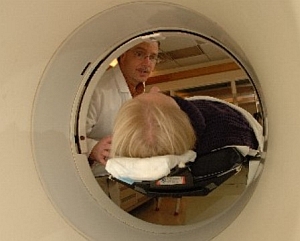The pharmaceutical company Merck and GE Healthcare, the medical technologies unit of General Electric, are collaborating in a clinical trial of Merck’s drug candidate for the treatment of Alzheimer’s disease. The trial is testing Merck’s compound known as MK-8931, a beta amyloid precursor protein site cleaving enzyme inhibitor.
The accumulation of beta amyloid proteins in the brain is associated with Alzheimer’s disease, but is normally discovered during post-mortem pathology examinations. GE Healthcare is developing a positron emission tomography (PET) imaging agent, called 18F flutemetamol to detect beta amyloid deposits in the brains of living patients. In the collaboration with Merck, GE Healthcare will provide 18F flutemetamol to identify patients who might benefit from an anti-amyloid therapy for participation in the clinical trial of MK-8931.
Because of the association between beta amyloid and Alzheimer’s disease, a current hypothesis holds that the accumulation of plaque from beta amyloid proteins may cause the disease. Merck says the beta amyloid precursor protein site cleaving enzyme (BACE) is a potential factor in the production of beta amyloid peptide. Evidence suggests that inhibiting BACE decreases the production of beta amyloid and may therefore reduce amyloid plaque formation and modify the progression of the disease.
The clinical trial testing MK-8931 aims to recruit some 1960 patients at three sites in the U.S. and France, age 55 to 85, with mild to moderate Alzheimer’s disease. The phase 2/phase 3 trial is testing MK-8931 against a placebo for both safety and efficacy over 78 weeks of treatment. An earlier safety (phase 1) trial, showed MK-8931 can reduce beta amyloid in cerebral spinal fluid by more than 90 percent in healthy volunteers without dose-limiting side effects.
In September, GE Healthcare reported the results of phase 3 trials of 18F flutemetamol that showed PET scans with the imaging agent are able to detect beta amyloid in living Alzheimer’s patients with a median sensitivity ranging from 75-100 percent and specificity ranging from 99-100 percent. The study showed similar sensitivity and specificity ranges in autopsies of deceased Alzheimer’s patients. Visual assessments of all patient images likewise showed a high level of agreement.
Read more:
- U.S. Alzheimer’s Patient Implanted with Deep Brain Pacemaker
- Enhanced MRI in Development for Faster Alzheimer’s Diagnosis
- Alzheimer’s Biomarker Project to Gain Whole Genome Data
- VTT, GE Healthcare to Partner on Alzheimer’s Biomarkers
- GE Healthcare, CSIRO to Partner on Alzheimer’s Diagnostics
Hat tip: MedCity News
* * *


 RSS - Posts
RSS - Posts
[…] Merck, GE Healthcare Partner on Alzheimer’s Treatment Trial […]